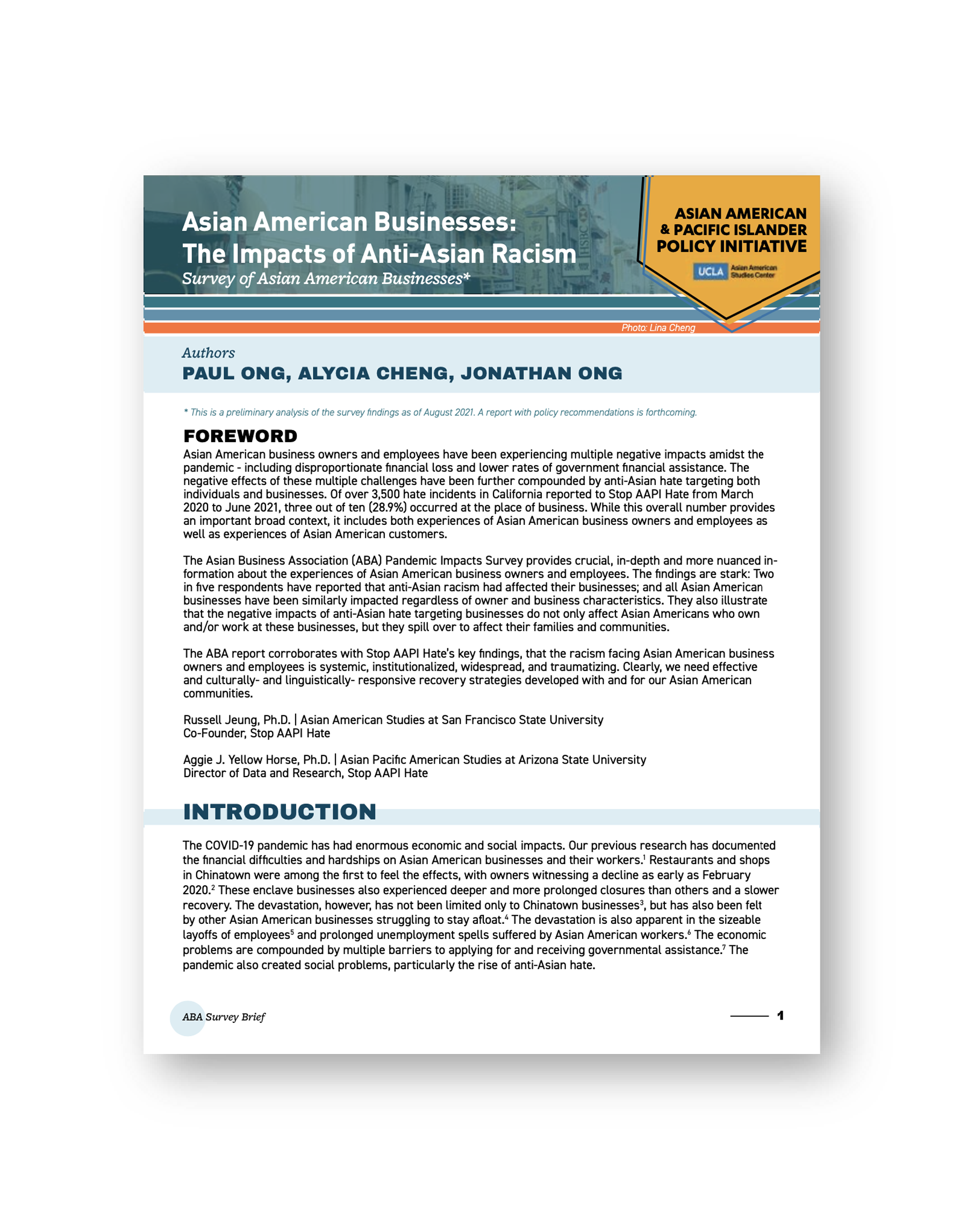
Asian American Businesses: The Impacts of Anti-Asian Racism, 2021
 |
2021 Authors: Paul Ong, Alycia Cheng, and Jonathan Ong UCLA Asian American Studies Center, UCLA Center for Neighborhood Knowledge, and Asian Business Association of Los Angeles |
Overview:
The COVID-19 pandemic has had enormous economic and social impacts. The pandemic also created social problems, particularly the rise of anti-Asian hate. Restaurants and shops in Chinatown were among the first to feel the effects, with owners witnessing a decline as early as February 2020. The origins of the pandemic and anti-Asian racism were very much centered around false beliefs that Chinese American businesses, particularly those in Chinatowns, were a source for the spread of the disease. Given continuing anti-Asian incidents, it is critically important that we have effective strategies and policies to ensure that Asian American businesses are safe places. This brief is organized into three parts: (1) Prevalence, Causes and Nature of Anti-Asian Racism; (2) Commonalities Among Impacted Asian American Businesses; and (3) Intersection with Personal and Family Anti-Asian Impacts. This brief is a preliminary analysis of survey findings as of August 2021. A report with policy recommendations is forthcoming.
Key Takeaways
- Anti-Asian racism has compounded the COVID-19 pandemic impacts on Asian American businesses, inflicting psychological, physical and financial damage on Asian American businesses, the owners and their staff.
- Three out of four respondents felt that anti-Asian racism has become more prevalent since the start of the pandemic
- Over two in five respondents reported that anti-Asian racism had affected their businesses. The effects took on many different forms, including harassment, vandalism, assault, or targeted theft.
- Impacts however include an array of subtler forms that could be considered equally disruptive or traumatic. The most frequent response was how the toxic climate created fear among the staff. Anti-Asian racism forced one in six businesses to change their operations due to safety concerns.
- A tenth of the respondents reported a decline in business transactions due to biased avoidance of Asian people and spaces.
- Anti-Asian incidents impacted many demographic subgroups. The survey shows similarities between males and females, immigrants and U.S. born individuals, and those between 35-54 years old and 55 plus. These results indicate that the animosity was racialized, thus affecting all Asian American businesses, regardless of ethnicity, gender, nativity and age.
- Anti-Asian racism is not just confined to the respondents’ businesses. About three-fifths reported that either they or family members were adversely affected.
- Nearly two-fifths said that they or their families personally fear being threatened or physically attacked.
- It is important to develop programs and resources specifically for AAPI businesses to address anti-AAPI hate incidents. This should be done by trusted organizations that have a long track history of working with and advocating for AAPI businesses.
- Addressing racism at the place of business is critically important to ensuring economic viability and social fairness. Asian American businesses and their associations can contribute to the broader effort to combat racism. This includes:
- Supporting the collection of information on anti-AAPI incidences by Stop AAPI Hate and other community organizations
- Encouraging efforts to improve the ability of law-enforcement and other public agencies to track anti-AAPI hate incidences, and demanding the prosecution of perpetrators of anti-AAPI hate.
- Building bridges and fostering racial solidarity between AAPI businesses and other communities to create a more inclusive and diverse nation.